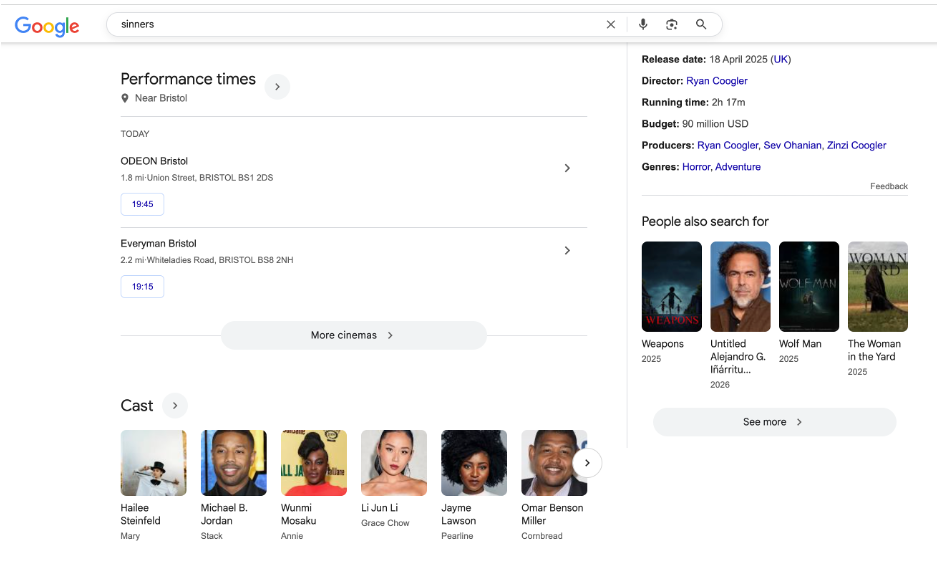Although it’s been around for some time now, Google RankBrain remains an important consideration when it comes to SEO. Read on to find out everything you need to know about it and how it impacts your business’s digital marketing.
What is Google RankBrain?
RankBrain is a part of Google’s core algorithm, nicknamed Hummingbird. It uses machine learning (AI) to understand search queries and deliver the most relevant results. It was launched in 2015 and, since then, the Google RankBrain algorithm has become one of the most important elements to determine what gets shown in search results.
RankBrain first came about when Google were looking for solutions to answer the 15% of queries they’d never had before. To interpret what people were looking for, it started using machine learning to understand links between words. It teaches itself and applies its learnings to search results.
How does RankBrain work?
Whenever you search for something, Google RankBrain is responsible for doing two important jobs:
- Understanding the intent of the keywords people are searching for.
- Measuring how satisfied users are with their search results.
Let’s dive a bit deeper into these two elements.
1. Keywords and intent
RankBrain uses machine learning to work out the user’s intent when searching for something.
For example, if you were to search for the title of a film that’s just come out, Google will automatically display nearby screenings times for the film at the top of the search results – even if all you searched was the film’s title. It infers, often from previous search behaviour, that you might be interested in watching the film, rather than simply reading a plot summary of it.

These days, RankBrain is also able to try and figure out what you’re trying to search for – even if you yourself aren’t entirely sure what it is. For example, say you searched for “album with a banana on the cover”. At one time, Google would have simply displayed pages that contained some of these terms: “album” and “banana”.
Today, RankBrain knows that if you search for “album with a banana on the cover”, you are of course trying to find The Velvet Underground’s iconic 1967 album – even though you haven’t searched for any of these words.

This is the power of Google RankBrain’s algorithm – it has learnt to infer meaning from what people say, and understand what they actually want (much like a human being does).
2. User satisfaction
Google RankBrain works out if the search results it has shown are any good by assessing how satisfied the user is with them. It does this by paying attention to several UX (user experience) signals, such as:
- Organic CTR (click-through rate)
- Bounce rate and dwell time
- Pogo-sticking
Essentially, these signals tell Google RankBrain if you’re satisfied with the search results it’s displayed or not. It will use this information to boost certain pages and adjust search results in the future. On the other hand, if a result is not engaging users, it will be demoted down the search rankings.
Why is RankBrain important?
As a user, RankBrain is of vital importance both for user experience, and for getting useful search results. When it comes to SEO, RankBrain is a very significant ranking factor – and something that every business should take into account when optimising their website for search.
How do I optimise my website for RankBrain?
There are several ways to ensure your website ranks favourably by using the way Google RankBrain works to your advantage.
1. Well-written, high value content
As Google is learning to interpret the overall sentiment of search queries, RankBrain favours content that is written in a natural, conversational style that is pleasant to read and easy to understand.
It’s also important to ensure you have high-value content on your website that answers the questions your target audience are searching, and explores in depth the topics they’re interested in. This will increase your authority in search rankings and help your website rank for more keywords.
The key is quality over quantity. Using AI to generate hundreds upon hundreds of generic, blandly written pages with no keyword optimisation will not make your website look good to Google’s RankBrain – and will likely negatively impact your ranking for key search terms.
2. Improve your click-through rate
Writing informative, easy to understand metadata for your website’s pages is crucial for RankBrain.
The meta titles and meta descriptions of your pages, for example, are displayed in search engine results. These should include keywords and neatly summarise what the page is about – and how it will satisfy a user’s search query. This makes them far more likely to click through to your page over other search results with confusing, bloated metadata.
3. Focus on user experience (UX)
The length of time a person spends on your website is a factor RankBrain takes into account. It’s never been more important to ensure your website is designed with UX at its core.
UX covers everything from making your website intuitive and easy to navigate, to breaking up the content on your pages into manageable sections and using clear headings to highlight key information.



